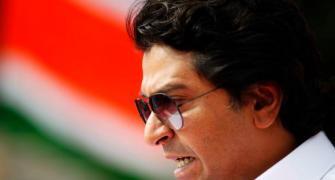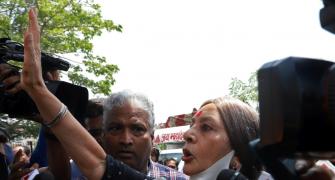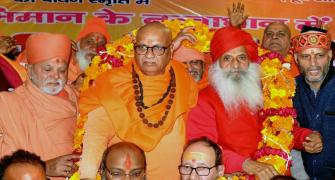The silence is specially deafening from three parties that symbolised hope for Muslims: The Congress, the Aam Aadmi Party and the Samajwadi Party.
'What fear prevents these leaders from at least talking about the way our community is being targeted? Will they really lose Hindu votes if they do so?'
Jyoti Punwani reports.

This has perhaps been the worst Ramzan for Muslims in the country.
This is not the first time that the month of Ramzan has passed under the shadow of communal violence. Indeed, in Moradabad in 1980, violence erupted right after the Eid namaaz. But while riots used to remain confined to one area (L K Advani's 1990 rath yatra, when town after town went up in flames, was an exception), today, social media brings every incident of violence, wherever it takes place, to our phones, often as it is happening. Videos of communal violence end up becoming compulsory viewing for the entire community.
So even in Mumbai, where Ramzan nights have returned in full swing after a gap of two pandemic years, the air is tinged with disquiet. And that's not only due to Raj Thackeray.
A government that, for once, refused to appease the MNS chief, and a police commissioner sensitive to the delicate communal situation, have allowed Mumbai's Muslims space to deal with Raj Thackeray's threat of reciting the Hanuman Chalisa outside mosques if loudspeakers on the latter are not removed.
The fact that Raj Thackeray himself postponed his ultimatum to May 3, the day on which Ramzan Eid falls, was an indication that this time he knew it wouldn't be easy for him to carry out his threats. Even his maha aarti on Hanuman Jayanti turned out to be a tame affair.
However, acutely conscious of the way the Bharatiya Janata Party could turn the loudspeaker issue into yet another major anti-Muslim campaign, Muslims in Maharashtra used the breather to discreetly work out strategies to avoid confrontation.
During Ramzan, loudspeakers are particularly prone to misuse, with repeated calls being made to wake up for sehri, the pre-dawn breaking of the fast. This was stopped, and loudspeaker volumes were reduced, especially early in the morning, keeping the 2005 Supreme Court ruling in mind, which stipulated that no loudspeakers be allowed between 10 pm and 6 am.
Hindus who, emboldened by Raj Thackeray's ultimatum, lodged complaints against mosques, found their grievances resolved promptly. Long-delayed applications for loudspeaker licences were made even before the police reiterated standard guidelines for loudspeaker use.
The Maharashtra Navnirman Sen has now threatened to perform maha aartis in temples on the day of Eid. It remains to be seen whether the police will allow these to create trouble. However, the transfer of Nashik Police Commissioner Deepak Pandey, days after he talked tough on Raj Thackeray's threats, is worrying, though it may have been done for other reasons.

***
"Raj Thackeray is not the problem. We can deal with his threat," says an influential maulana. What the community found difficult to deal with was the barrage of onslaughts against it in the last few months, and what lay in store. "We've been pushed against the wall and no one seems to care," said the maulana.
The loudspeaker issue was, in fact, waiting to be resolved; many Muslims have for long been trying to convince the ulema to curtail their use. The real threat, said the maulana, lay in the possibility that azaan itself may be banned, a scenario discussed by television news channels that thrive on Muslim-bashing.
The very thought of a ban on a practice that is as integral to Islam as namaaz, seemed inconceivable, an existential threat to the community, and a frightening culmination of the attacks on their fundamental rights seen over the last six months.
"How much more will we be dishonoured in our own country?" asked the maulana.
What has made matters worse is the lack of opposition on the ground. "Our homes are being bulldozed. What kind of law is this which punishes X for the crime of Y? And everyone seems to think it's okay," said an elderly community leader. "Not even a morcha is being taken out by those who normally do so. Granted, those used to be token protests, but at least they made us feel that someone cared. Now, there's silence all around."
The silence is specially deafening from three parties that symbolised hope for Muslims: The Congress, the Aam Aadmi Party and the Samajwadi Party. The first, which has traditionally been supported by Muslims, was nowhere to be seen on the ground. As one supporter put it: "We cannot understand what paralysis has overtaken the party." Yet, such is the community's emotional bond with the Congress that they blamed Arvind Kejriwal's AAP for trying to replace it.
AAP which, from its inception, gathered tremendous Muslim support, increasingly seemed to be focused on proving itself to be Hindu. This, coupled with Kejriwal's silence on communal violence, specially the 2020 Delhi riots -- except when specifically asked about it -- has left Muslims disenchanted.
As if these two disappointments were not enough, a third leader has now turned out to have feet of clay. Muslims are baffled at Samajwadi Party chief Akhilesh Yadav's silence on their issues, after the community voted almost exclusively for him in the recent UP assembly elections.
"What fear prevents these leaders from at least talking about the way our community is being targeted?" asked a businessman who is on good terms with all non-BJP parties. "Will they really lose Hindu votes if they do so? And yet, we are expected to vote for them!"

The silence of the supposedly secular parties on the relentless bullying of Muslims would have been bad enough; the eloquence of Asaduddin Owaisi on this very issue has made it unbearable. Muslims across the country are loath to vote for the AIMIM, eyeing Owaisi with suspicion as one who directly or indirectly helps the BJP.
Yet, the Hyderabad MP's strident espousal of their right to a share in power, has made them even more resentful at "being taken for granted" by the others, even though they acknowledge that Owaisi has done nothing concrete for them.
The combination of these two factors has also eroded the credibility of moderate Muslims in the eyes of the youth. "People like us know that the majority of Hindus want to live in peace with us, but it's becoming very difficult to convince the youth," said a middle-aged grassroots community worker. In Maharashtra too, he pointed out, Ram Navami processions had been provocative, but Muslims had refused to rise to the bait.
This conversation took place before the Jahangirpuri violence in Delhi, and the subsequent demolition of mostly Muslim homes, that followed the playbook set by Uttar Pradesh Chief Minister Yogi Adityanath and followed by MP CM Shivraj Singh Chouhan.
But there the similarity ended.
The bulldozer in Jahangirpuri was physically stopped by the CPI-M's Brinda Karat. A galaxy of lawyers also obtained a Supreme Court stay on the demolitions.

One wonders whether these concrete acts will assuage the feelings of isolation and helplessness that engulf Muslims today. Or will these be seen as having happened only because events in the national capital always evoke a heightened response?
Legal recourse against the government's arbitrary and illegal acts was taken even in UP. Now, the Khargone demolitions have also been challenged in court. But will Brinda Karat's action inspire other political leaders to show the same courage and commitment?
Feature Presentation: Aslam Hunani/Rediff.com









